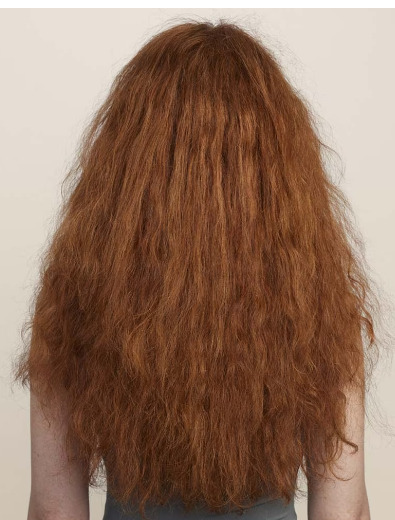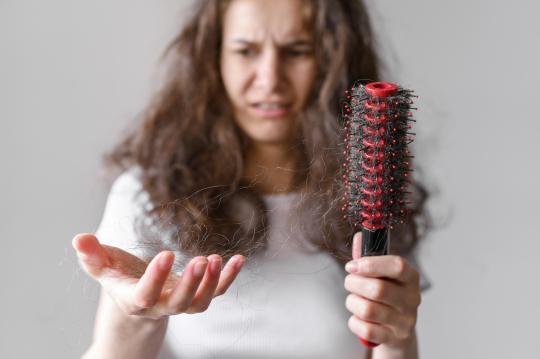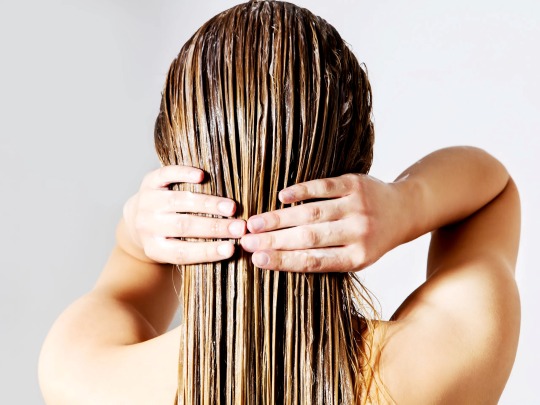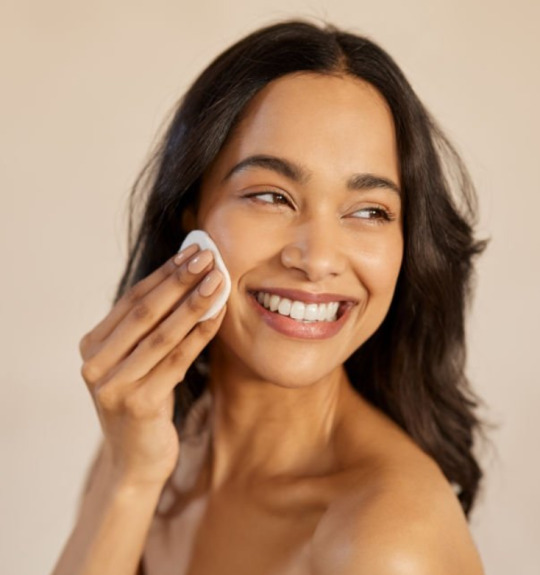Don't wanna be here? Send us removal request.
Text
Hair Mask For Dry Hair

A hair mask for dry hair is an intensive hair treatment product designed to address and alleviate the problems associated with dry, damaged, or dehydrated hair. It is formulated with a concentrated blend of nourishing and moisturizing ingredients to provide deep hydration, repair damaged hair, and improve overall hair health. Here’s a more detailed definition:
Purpose: The best Hair masks for dry hair are specifically created to combat the effects of dryness, which can result from various factors, including environmental conditions, excessive heat styling, chemical treatments, or natural hair texture.
Key Ingredients: These masks contain a variety of ingredients that work together to restore moisture and repair the hair. Common ingredients found in hair masks for dry hair include:
Natural Oils: Such as coconut oil, argan oil, olive oil, jojoba oil, and avocado oil, which are rich in fatty acids and vitamins to moisturize and nourish the hair.
Shea Butter: A natural emollient that provides deep conditioning and helps seal in moisture.
Proteins: Such as keratin or hydrolyzed wheat protein, which help strengthen and repair damaged hair strands.
Vitamins: Like vitamin E and B vitamins, which promote hair health and hydration.
Hydrolyzed Collagen: Helps improve hair elasticity and strength.
Application: To use a best hair mask for dry hair, follow these steps:
Shampoo your hair as usual to remove any dirt and product buildup. Gently squeeze out excess water from your hair. Apply the hair mask generously to damp hair, concentrating on the mid-lengths and ends. Comb or distribute the mask evenly using your fingers. Leave the mask on for the specified time recommended on the product label (usually 10–30 minutes). Some masks may require heat application, which can enhance penetration. Rinse the mask out thoroughly with lukewarm water. You can follow up with your regular conditioner if desired. Style your hair as usual.
Benefits: The use of a best hair mask for dry hair typically results in:
Improved hair hydration and moisture retention. Softer, smoother, and more manageable hair. Reduction in frizz and fly aways. Enhanced hair shine and luster. Repair of damaged or brittle hair. Frequency: How often you use a best hair mask for dry hair can vary, but it’s generally recommended to use it once a week or as needed, depending on the severity of your hair’s dryness and damage.
In summary, a best hair mask for dry hair is a specialized treatment that provides deep nourishment and hydration to dry and damaged hair, helping to restore its health, shine, and manageability. It is a valuable addition to a hair care routine, especially for individuals with dry or stressed hair.
0 notes
Text
Shampoo For Reducing Hair Fall

The best shampoo for hair fall, also known as hair loss or hair thinning, should address the underlying causes of hair fall while promoting hair health. There are various factors that can contribute to hair fall, including genetics, hormonal imbalances, poor nutrition, scalp conditions, and environmental factors. A good anti-hair fall shampoo should aim to mitigate these factors. Here is a detailed definition of what makes a shampoo effective for preventing hair fall:
DHT Blockers: Dihydrotestosterone (DHT) is a hormone associated with hair loss in genetically predisposed individuals. A good anti-hair fall shampoo may contain ingredients like ketoconazole, saw palmetto, or caffeine, which can help inhibit the production of DHT or reduce its effects on the hair follicles.
Nutrient-Rich Formulation: A quality of the best shampoo for hair fall is that it should contain essential nutrients like biotin, niacin, panthenol, and vitamins (such as B-complex vitamins) that promote hair growth and strengthen hair follicles.
Natural Ingredients: Shampoos with natural ingredients like aloe vera, ginseng, ginkgo biloba, or green tea can have a soothing and nourishing effect on the scalp and hair, which may help reduce hair fall.
Protein Enriched: Proteins like keratin can help strengthen hair strands, reducing breakage and hair fall. Look for shampoos with protein-enriched formulas.
Moisturizing and Hydrating: Dry and brittle hair is more prone to breakage. A shampoo that moisturizes and hydrates the hair and scalp can improve overall hair health and minimize hair loss.
pH-Balanced: A pH-balanced shampoo can help maintain the natural pH of your scalp, creating a healthier environment for your hair follicles.
Sulfate-Free: Sulfates can be harsh on the hair and scalp, potentially leading to damage and hair fall. Sulfate-free are the best shampoo are gentler on the hair and scalp.
Clinical Studies: Look for the best shampoo that have undergone clinical testing and provide evidence of their effectiveness in reducing hair fall. Many reputable hair care brands conduct clinical trials to support their claims.
Consistency: Hair care takes time, and you need to use the best shampoo for hair fall consistently over an extended period to see results. Patience is essential when addressing hair fall.
0 notes
Text
Shampoo For Strong Hair

There are some Points Before usage of shampoo :Shampoo is a hair care product that is primarily used for cleansing the hair and scalp. Its main purpose is to remove dirt, oil, sweat, product buildup, and other impurities from the hair and scalp, leaving them clean and refreshed. Shampoo is an essential part of a regular hair care routine and is available in various formulations to address different hair types and concerns.
Here is a more detailed definition of best hair shampoo:
Cleaning Agent: The best hair shampoo contains surfactants, which are chemicals that help break down and remove dirt and oils from the hair and scalp. Surfactants work by reducing the surface tension of water, allowing it to lift away impurities more effectively.
pH Balance: Shampoos are formulated to have a pH level that is close to the natural pH of the scalp, which is typically around 5. This helps maintain the health and integrity of the scalp and hair. The best hair shampoo are designed to be slightly acidic to protect the hair cuticle.
Ingredients: Shampoo formulations can vary widely, but they generally include the following key ingredients:
Water: The primary ingredient in most shampoos, which serves as the solvent for other components.
Surfactants: These are responsible for the cleansing action of the shampoo. Common surfactants include sodium lauryl sulfate (SLS) and sodium laureth sulfate (SLES).
Conditioning Agents: Some shampoos contain ingredients like silicones or fatty alcohols to provide a soft and smooth texture to the hair.
Fragrances: To give the shampoo a pleasant scent.
Preservatives: These help extend the shelf life of the product.
Specialty Ingredients: Depending on the type of shampoo, additional ingredients may be included, such as herbal extracts, vitamins, or proteins to address specific hair concerns like dandruff, dryness, or volume.
Types of Shampoo: There are various types of shampoos available to cater to different hair types and concerns. Some common types include:
Moisturizing Shampoo: Designed for dry or damaged hair, these shampoos aim to add moisture and improve the texture of the hair.
Clarifying Shampoo: These are formulated to remove product buildup and excess oils from the hair.
Anti-Dandruff Shampoo: Created to combat dandruff and scalp conditions, often containing active ingredients like pyrithione zinc or salicylic acid.
Color-Protecting Shampoo: Formulated to help preserve the color and vibrancy of dyed or treated hair.
Volumizing Shampoo: Meant to add body and volume to limp or fine hair.
Proper Usage: To use the best shampoo effectively, wet your hair thoroughly, apply a small amount of shampoo, and massage it into your scalp and hair. Rinse thoroughly with water. It’s important not to use excessive shampoo, as this can strip the hair of natural oils and potentially cause dryness.
In summary, the best shampoo is a hair care product that cleanses the hair and scalp by removing dirt and oils. It is formulated with various ingredients to cater to different hair types and concerns, and its proper use is essential for maintaining healthy and clean hair.
Certainly, here is a more detailed definition of hair shampoo:
The best shampoo is a specialized liquid or gel-based hair care product designed for the primary purpose of cleansing and maintaining the health of the hair and scalp. It plays a crucial role in the overall hygiene and cosmetic appearance of an individual’s hair. Shampoos are available in a wide range of formulations, each tailored to address specific hair types, textures, and concerns.
Key characteristics and components of shampoo:
Surfactants: Shampoos contain surfactants, which are surface-active agents responsible for the cleansing action. These molecules have a hydrophilic (water-attracting) head and a hydrophobic (water-repelling) tail. Surfactants work by emulsifying oils and lifting away dirt, debris, and impurities from the hair and scalp, allowing them to be rinsed off with water.
pH Balance: A critical aspect of the best shampoo formulation is maintaining an appropriate pH level. The pH of most shampoos is slightly acidic, generally around 5 to 7, which is close to the natural pH of the scalp. This helps to protect the hair’s cuticle layer and maintain the scalp’s health.
Ingredients: Shampoo formulations may vary, but they commonly include the following ingredients:
Water: The primary ingredient that serves as a solvent for other components.
Surfactants: These are responsible for the primary cleansing function and can vary in strength and type depending on the shampoo’s purpose.
Conditioning Agents: Some shampoos contain ingredients like silicones, fatty alcohols, or natural oils to provide conditioning effects, making the hair softer and more manageable.
Fragrances: To provide a pleasant scent, making the shampoo more appealing.
Preservatives: Included to prevent microbial growth and extend the product’s shelf life.
Specialty Ingredients: Depending on the shampoo type, additional ingredients may be added, such as botanical extracts, vitamins, proteins, or active ingredients to address specific hair concerns.
Types of Shampoo: Shampoos are formulated to cater to various hair types and concerns. Some common types include:
Moisturizing Shampoo: Designed for dry or damaged hair, these shampoos aim to add moisture and improve hair texture.
Clarifying Shampoo: Formulated to remove product buildup and excess oils from the hair.
Anti-Dandruff Shampoo: Developed to combat dandruff and scalp conditions, often containing active ingredients like pyrithione zinc or salicylic acid.
Color-Protecting Shampoo: Meant to preserve the color and vibrancy of dyed or treated hair.
Volumizing Shampoo: Designed to add body and volume to limp or fine hair.
Proper Usage: To use shampoo effectively, wet your hair thoroughly, apply a small amount of shampoo, and massage it into your scalp and hair, concentrating on the roots and working your way down to the tips. Rinse the shampoo thoroughly with water. Using an excessive amount of shampoo can strip the hair of natural oils and potentially lead to dryness.
0 notes
Text
The Hair Mask For Self Care

There are Many Types of Hair Mask Which is Mentioned Below Suitable For Ones Hair:
1. Ingredients: A best hair mask hair mask should contain beneficial ingredients that cater to your specific hair needs. Look for best hair mask with natural oils like coconut, argan, jojoba, or avocado oil. These oils help moisturize and nourish your hair. Other ingredients to consider are shea butter, keratin, amino acids, and proteins for repairing and strengthening damaged hair. For those with color-treated hair, a mask with UV protection can help maintain the vibrancy of your hair color.
2. Hair Type Compatibility: Different hair types have different requirements. Look for a best hair mask that is specifically designed for your hair type, whether it’s fine, thick, curly, straight, or chemically treated. Each type requires a different set of ingredients to address its unique needs.
3. Sulfate and Paraben-Free: Sulfates and parabens can be harsh on your hair and scalp. A best hair mask should be free of these ingredients to prevent further damage and irritation.
4. Deep Conditioning: The purpose of a best hair mask is to provide deep conditioning. It should penetrate the hair shaft to moisturize, repair, and nourish from within. Look for a mask with ingredients that can penetrate the hair cuticle to provide lasting benefits.
5. Hydration and Repair: Hydration is crucial for preventing dryness and frizz, while repair is essential for damaged hair. The Best hair Mask with ingredients like hyaluronic acid, vitamins, and antioxidants help hydrate your hair, while masks with keratin or amino acids help repair and strengthen it.
6. Application and Usage: Consider the ease of use. Some masks are designed for quick application in the shower, while others require longer treatment times. Choose one that fits your routine and preferences.
7. Scalp Health: Healthy hair starts with a healthy scalp. Some masks are formulated to promote scalp health, which, in turn, contributes to healthier hair growth.
8. Fragrance: Some people prefer lightly scented masks for a pleasant experience, while others may have sensitivity to fragrances. Choose a mask that aligns with your preference.
9. Results: Ultimately, a best hair mask should leave your hair feeling softer, smoother, and healthier. It should help reduce frizz, add shine, and improve manageability. The results should be noticeable after regular use.
0 notes
Text
Face wash For Daily Routine

1. Importance of Face Wash: Face wash is essential for maintaining clean and healthy skin. The best face wash for an individual depends on their specific skin type and concerns
It helps remove makeup, sweat, environmental pollutants, and excess oil.
Proper cleansing can prevent acne, breakouts, and other skin issues.
Using the right face wash can hydrate, exfoliate, and address specific skin concerns.
2. Types of Face Wash:
Cleansing Face Wash: These are gentle, everyday face washes designed for regular use. They help remove surface impurities without over-drying the skin.
Acne-Fighting Face Wash: These contain ingredients like salicylic acid or benzoyl peroxide to combat acne and breakouts.
Hydrating Face Wash: Designed to add moisture and nourishment to dry or dehydrated skin.
Exfoliating Face Wash: Contains exfoliating agents (like alpha or beta hydroxy acids) to remove dead skin cells and promote a brighter complexion.
Sensitive Skin Face Wash: Formulated with soothing and non-irritating ingredients for those with sensitive skin.
Anti-Aging Face Wash: Contains ingredients like retinol or peptides to target signs of aging.
3. Choosing the Right Face Wash:
Determine your skin type (e.g., oily, dry, combination) to select a face wash that suits your needs.
Identify specific skin concerns (e.g., acne, aging, sensitivity) to choose a product tailored to those concerns.
Check the ingredients list for potential irritants or allergens, especially if you have sensitive skin.
Consider your budget and brand preferences when selecting a face wash.
4. How to Use Face Wash:
Wet your face with lukewarm water.
Apply a small amount of face wash to your fingertips or a cleansing tool.
Gently massage the product onto your face in a circular motion, avoiding the eye area.
Rinse thoroughly with water.
Pat your face dry with a clean, soft towel.
5. Frequency:
Most people use face wash twice daily, in the morning and evening, as part of their skincare routine.
Adjust the frequency based on your skin type and concerns; some may need to wash their face more or less often.
6. Additional Skincare Steps:
After using face wash, follow with toner, moisturizer, and sunscreen during the day.
Depending on your skincare routine, you may also incorporate serums, exfoliants, and other products.
Remember that the “best” face wash varies from person to person, depending on their individual skin type and concerns. It’s important to select a product that works for your unique needs and to use it consistently to maintain healthy and glowing skin
Facewash For Pimples
Face Wash For Nourishing
1 note
·
View note